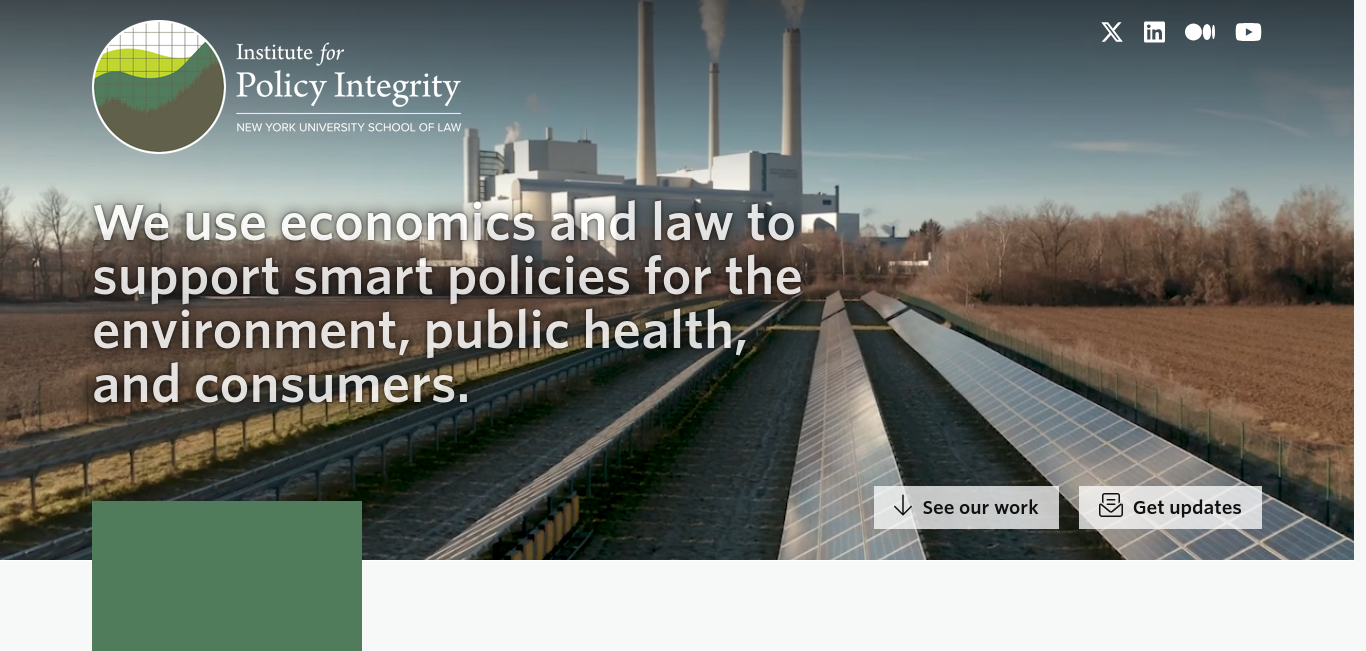Institute for Policy Integrity at NYU School of Law
Created in 2008


Up & running (A)
Existing signals show a regular activitySocial networks
3,356 3,041Activities
Entity types
Location
40 Washington Square S, New York, NY 10012, USA
New York
United States of America
Employees
Scale: 11-50
Estimated: 39
Engaged catalyst
5
0 0Added in Motherbase
3 years, 6 months ago
Value proposition
Using economics and law to protect the environment, public health, and consumers.
The Institute for Policy Integrity is a non-partisan think tank dedicated to improving the quality of governmental decisionmaking. We produce original scholarly research in the fields of economics, law, and regulatory policy. We also advocate for reform before courts, legislatures, and executive agencies.
Our primary focus areas include energy, climate change, natural resources, environmental health, and regulatory policy. Policy Integrity regularly collaborates with non-governmental organizations, facilitating their effective participation in the regulatory process.
Environmental Law, Environmental Regulation, Public Policy, and Economics
Institute for Policy Integrity
The Institute for Policy Integrity at NYU School of Law uses economics and law to support smart policies for the environment, public health, and consumers.
https://policyintegrity.org/

| Catalyst | Type | Tweets | Articles | |
|---|---|---|---|---|
 Coalition for Green Capital Renewable Energy Semiconductor Manufacturing | Coalition for Green Capital Renewable Energy Semiconductor Manufacturing | Other 20 May 2024 | | |
 Google IT services, Software Development | Google IT services, Software Development | Other 14 Apr 2020 | | |
 PwC Consulting, audit, IT Services and IT Consulting | PwC Consulting, audit, IT Services and IT Consulting | Other 9 Oct 2020 | | |
 Sodexo Food and beverage, Facilities Services | Sodexo Food and beverage, Facilities Services | Other 2 Oct 2020 | | |
 IHS Markit IT services, Information Services | IHS Markit IT services, Information Services | Other 13 Jan 2021 | | |
Some senators want to use the Congressional Review Act to end the waiver allowing California to enact stricter vehicle emissions standards than the U.S. government. In a new Bloomberg Law article, our Richard Revesz explains why doing this would violate the law. ⬇️
https://lnkd.in/gNctvPc2
EPA wants to reconsider its 2009 Endangerment Finding for GHG emissions, emphasizing that it didn't consider future regulatory costs. Our issue brief explains that EPA must assess these costs when setting standards, not when making an endangerment finding. ⬇️
The issue brief reviews:
🏛️ Key court decisions clarifying that policy considerations, including cost, should not be part of an endangerment finding;
📜 The statutory text’s exclusion of cost from the endangerment finding and separate requirement to consider costs when issuing regulations; and
🌳 The legal and analytical appropriateness of EPA’s approach to consider the costs and benefits of the greenhouse gas regulations at the time of their issuance—and EPA’s findings that the greenhouse gas regulations deliver overwhelming benefits for public health and the environment.
Check out the full issue brief here: https://lnkd.in/gqpFy5Wb
Many view the major questions doctrine as an anti-regulatory tool. But our Kelly McGee explains that it's actually an interpretive tool applying in extraordinary cases of unheralded, transformative, and vast agency action—including the President's tariffs.
Read the full blog from the Yale Journal on Regulation here:
https://lnkd.in/gRQYdVzJ
The House Judiciary Committee has embedded sweeping regulatory reform provisions into its 2025 budget reconciliation proposal. This issue brief explains why these provisions pose serious threats to both regulatory stability and constitutional separation of power, and why they are not primarily budgetary in nature (thus violating the Byrd Rule).
https://lnkd.in/gW7rDGKd
For nearly twenty years, the federal government has used economic values of climate change's impacts to inform critical decisions. Until now.
In a new issue brief with Peter H. Howard and Jason Schwartz, we explain why the government's retreat from the social cost of greenhouse gases violates good economics, science, and law.